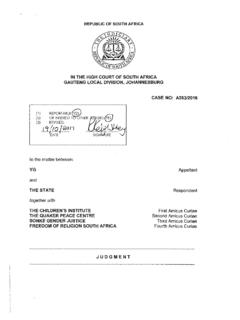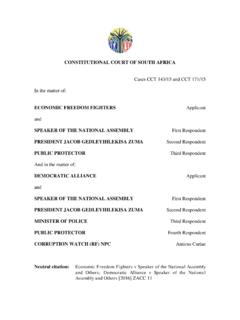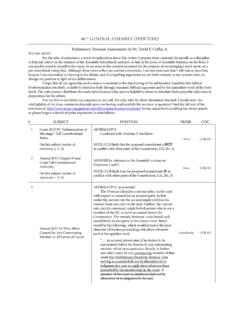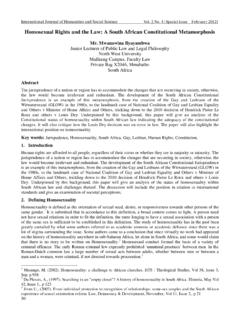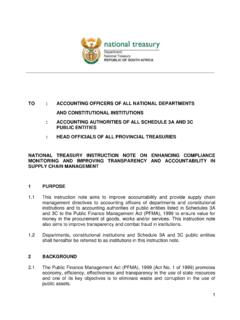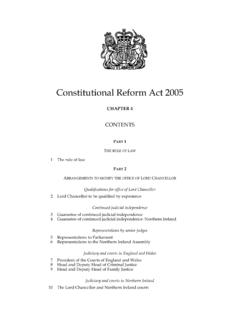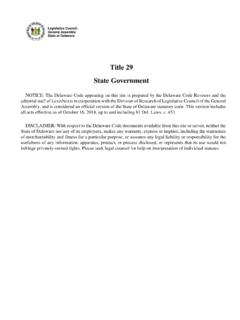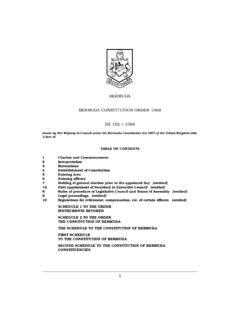Transcription of CONSTITUTIONAL COURT OF SOUTH AFRICA - SAFLII
1 CONSTITUTIONAL COURT OF SOUTH AFRICA . Case CCT 89/17. In the matter between: UNITED DEMOCRATIC MOVEMENT Applicant and SPEAKER OF THE NATIONAL assembly First Respondent PRESIDENT JACOB ZUMA Second Respondent AFRICAN NATIONAL CONGRESS Third Respondent DEMOCRATIC ALLIANCE Fourth Respondent ECONOMIC FREEDOM FIGHTERS Fifth Respondent INKATHA FREEDOM PARTY Sixth Respondent NATIONAL FREEDOM PARTY Seventh Respondent CONGRESS OF THE PEOPLE Eighth Respondent FREEDOM FRONT Ninth Respondent AFRICAN CHRISTIAN DEMOCRATIC PARTY Tenth Respondent AFRICAN INDEPENDENT PARTY Eleventh Respondent AG ANG SOUTH AFRICA Twelfth Respondent PAN AFRICANIST CONGRESS OF AZANIA Thirteenth Respondent AFRICAN PEOPLE'S CONVENTION Fourteenth Respondent and COUNCIL FOR THE ADVANCEMENT OF THE. SOUTH AFRICAN CONSTITUTION First Amicus Curiae UNEMPLOYED PEOPLES' MOVEMENT Second Amicus Curiae INSTITUTE FOR SECURITY STUDIES Third Amicus Curiae SHOSHOLOZA PROGRESSIVE PARTY Fourth Amicus Curiae Neutral citation: United Democratic Movement v Speaker of the National assembly and Others [2017] ZACC 21.
2 Coram: Mogoeng CJ, Nkabinde ADCJ, Cameron J, Froneman J, Jafta J, Khampepe J, Madlanga J, Mhlantla J, Mojapelo AJ, Pretorius AJ. and Zondo J. Judgments: Mogoeng CJ (unanimous). Heard on: 15 May 2017. Decided on: 22 June 2017. Summary: section 102 of the Constitution motion of no confidence . voting secret ballot President Speaker section 42 of the Constitution section 55 of the Constitution accountability section 57 of the Constitution . National assembly separation of powers ORDER. On application for exclusive jurisdiction or direct access the COURT orders: 1. The United Democratic Movement is granted direct access. 2. It is declared that the Speaker of the National assembly has the CONSTITUTIONAL power to prescribe that voting in a motion of no confidence in the President of the Republic of SOUTH AFRICA be conducted by secret ballot. 3. The Speaker's decision of 6 April 2017 that she does not have the power to prescribe that voting in the motion of no confidence in the President be conducted by secret ballot is set aside.
3 4. The United Democratic Movement's request for a motion of no confidence in the President to be decided by secret ballot is remitted to the Speaker for her to make a fresh decision. 5. The Speaker and the President must pay the costs of the United Democratic Movement, the Economic Freedom Fighters, the Inkatha Freedom Party and the Congress of the People, including costs of two counsel where applicable. JUDGMENT. MOGOENG CJ (Nkabinde ADCJ, Cameron J, Froneman J, Jafta J, Khampepe J, Madlanga J, Mhlantla J, Mojapelo AJ, Pretorius AJ and Zondo J concurring): Introduction [1] SOUTH AFRICA is a CONSTITUTIONAL democracy a government of the people, by the people and for the people through the instrumentality of the Constitution. It is a system of governance that we the people consciously and purposefully opted for to create a truly free, just and united Central to this vision is the improvement of the quality of life of all citizens and the optimisation of the potential of each through good governance.
4 1 The Preamble to the Constitution starts: We, the people of SOUTH AFRICA . 3. MOGOENG CJ. [2] Since constitutions and good governance do not self-actualise, governance structures had to be created to breathe life into our collective aspirations. Hence the existence of the legislative, executive and judicial arms of the State. They each have specific roles to play and are enjoined to inter-relate as foreshadowed by the following principle that guided our constitution-making process: There shall be a separation of powers between the legislature, executive and judiciary, with appropriate checks and balances to ensure accountability, responsiveness and openness. 2. [3] Knowing that it is not practical for all fifty five million of us to assume governance responsibilities and function effectively in these three arms of the State and its organs, we the people designated messengers or servants to run our CONSTITUTIONAL errands for the common good of us all.
5 These errands can only be run successfully by people who are unwaveringly loyal to the core CONSTITUTIONAL values of accountability, responsiveness and openness. And this would explain why all have to swear obedience to the Constitution before the assumption of office. 3. Essential context [4] Unelected servants of the people serve in the Judiciary that comprises Judges and Magistrates. Judges are selected by a CONSTITUTIONAL body which comprises Members of Parliament from the ruling and opposition parties, a few Judges, a Cabinet Member, a few legal practitioners, a university law teacher and the President's Of the candidates who prove to be fit and proper for a judicial vacancy at the level applied for, one is then appointed by the And like all other accountable servants of the people, their under-performance or 2 CONSTITUTIONAL Principle VI in Schedule 4 to the interim Constitution. See also Certification of the Constitution of Republic of SOUTH AFRICA [1996] ZACC 26; 1996 (4) SA 744 (CC); 1996 (10) BCLR 1253 (CC) (Certification case) at para 45.
6 3 Sections 48, 62, 87, 95 and 174 of the Constitution. 4 Section 178 of the Constitution. 5 Section 174 of the Constitution. 4. MOGOENG CJ. sanctionable conduct could result in their removal from office through an impeachment process if the Judiciary, Parliament and the President so [5] The people's representatives in Parliament are chosen through an electoral process. Each citizen qualified to vote may participate in that process that is designed to deliver free and fair elections. Those who stand for public office and are elected 7. must attend the first sitting of the National It is at that first sitting that at least three things over which the Judiciary presides must happen. First, Members of the assembly must be affirmed or sworn Second, the Speaker of the assembly must be elected by Third, Members of the assembly must elect the President of the Meaning, two arms of the State, the Judiciary and Parliament, each has a different but critical role to play in the process of electing the Head of State and Head of the Executive after general elections.
7 Thereafter the President must be sworn And that oath comes with serious [6] The President is an indispensable actor in the proper governance of our Republic and bears important CONSTITUTIONAL To enable him or her to discharge these obligations, he or she has a fairly free hand in assembling the service-delivery team another set of servants comprising the Deputy President and a number of Ministers required to exercise the executive authority of the As 6 Section 177 of the Constitution. 7 Sections 19 and 47 of the Constitution. 8 Section 51 of the Constitution. 9 Section 48 of the Constitution. 10 Section 52 of the Constitution. 11 Section 86 of the Constitution. 12 Section 87 and Schedule 2 item 1 of the Constitution. 13 Schedule 2 item 1 of the Constitution. 14 Sections 83, 84 and 85 of the Constitution. See also Economic Freedom Fighters v Speaker of the National assembly [2016] ZACC 11; 2016 (3) SA 580 (CC); 2016 (5) BCLR 618 (CC) at paras 20-2.
8 15 Section 91 of the Constitution. 5. MOGOENG CJ. many Deputy Ministers as are deemed necessary may also be Like Cabinet Ministers, they may be [7] Public office, in any of the three arms, comes with a lot of power. That power comes with responsibilities whose magnitude ordinarily determines the allocation of resources for the performance of public functions. The powers and resources assigned to each of these arms do not belong to the public office-bearers who occupy positions of high authority therein. They are therefore not to be used for the advancement of personal or sectarian interests. Amandla awethu, mannda ndiashu, maatla ke a rona or matimba ya hina (power belongs to us) and mayibuye iAfrika (restore AFRICA and its wealth) are much more than mere excitement-generating slogans. They convey a very profound reality that State power, the land and its wealth all belong to we the people , united in our diversity. These servants are supposed to exercise the power and control these enormous resources at the beck and call of the people.
9 Since State power and resources are for our common good, checks and balances to ensure accountability enjoy pre-eminence in our governance system. [8] This is all designed to ensure that the trappings or prestige of high office do not defocus or derail the repositories of the people's power from their core mandate or errand. For this reason, public office-bearers, in all arms of the State, must regularly explain how they have lived up to the promises that inhere in the offices they occupy. And the objective is to arrest or address underperformance and abuse of public power and resources. Since this matter is essentially about executive accountability, that is where the focus will be. [9] Accountability, responsiveness and openness 18 enjoin the President, Deputy President, Ministers and Deputy Ministers to report fully and regularly to 16 Section 93 of the Constitution. 17 Sections 91(2) and 93(1) of the Constitution. 18 Section 1(d) of the Constitution.
10 6. MOGOENG CJ. Parliament on the execution of their After all, Parliament is elected to represent the people and to ensure government by the people under the Constitution .20. [10] It thus falls on Parliament to oversee the performance of the President and the rest of Cabinet and hold them accountable for the use of State power and the resources entrusted to them. And sight must never be lost that all CONSTITUTIONAL obligations must be performed diligently and without delay .21 When all the regular checks and balances seem to be ineffective or a serious accountability breach is thought to have occurred, then the citizens' best interests could at times demand a resort to the ultimate accountability-ensuring mechanisms. Those measures range from being voted out of office by the electorate 22 to removal by Parliament through a motion of no confidence 23 or These are crucial accountability-enhancing instruments that forever remind the President and Cabinet of the worst repercussions that could be visited upon them, for a perceived or actual mismanagement of the people's best interests.









